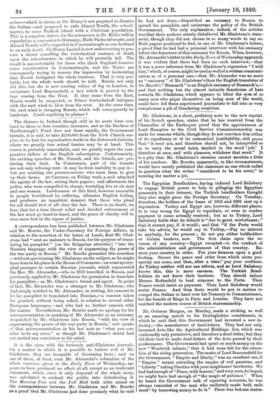It is the same with the furiously anti-Gladstone journals. On
a matter in which it is possible to believe evil of Mr. Gladstone, they are incapable of discerning facts ; and on one of them, at least, even Mr. Alexander's refutation of the whole romance, given in the Daily News of Wednesday, ap- pears to have produced no effect at all, except as an irrelevant statement, which, since it only disposed of the whole story, was calculated to mislead the public into disbelieving it. The Morning Poet and the Pall Maid both alike seized on the correspondence between Mr. Gladstone and Mr. Bourke as a proof that Mr. Gladstone liad done precisely what he said
he had not done,—dispatched an emissary to Russia to. spread his pamphlet, and embarrass the policy of the British Government. The only explanation, indeed, of the articles was that their authors utterly disbelieved Mr. Gladstone's state- ment, though they did not choose in so many words to say so. Both papers professed to find, in one of Mr. Gladstone's letters,_ a proof that he had had a personal interview with his emissary before the departure of that emissary for Russia. When, however, Mr. Alexander's letter to the Daily News of Wednesday appeared, it was evident that there had been no such interview,—that it was a mere inference from Mr. Gladstone's expression "I told him," which, of course, might be used as well of a written communi- cation as of a personal one,—that Mr. Alexander was no more an" emissary" of Mr. Gladstone's than the English translator of Dr. Busch's " Bismarck "is an English emissary of Bismarck's,— and that nothing but the almost imbecile fanaticism of hate towards Mr. Gladstone, which appears to blind the eyes of so many men who pique themselves on being men of the world,. could have led these experienced journalists to fall into so very conspicuous a pit of blundering suspicion.


































 Previous page
Previous page